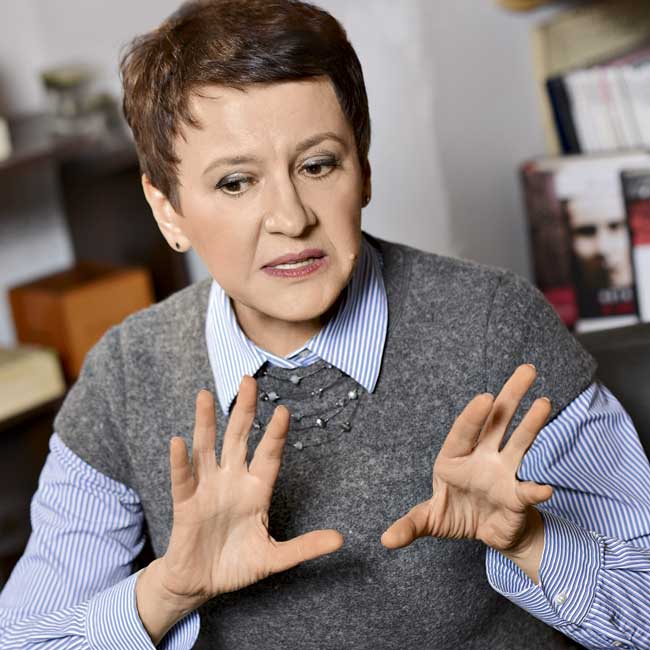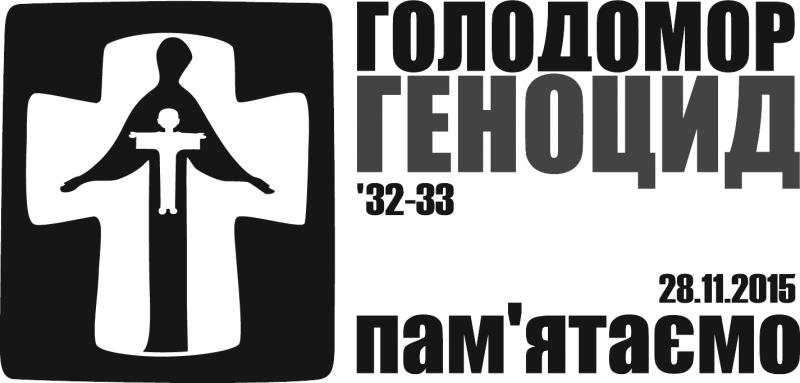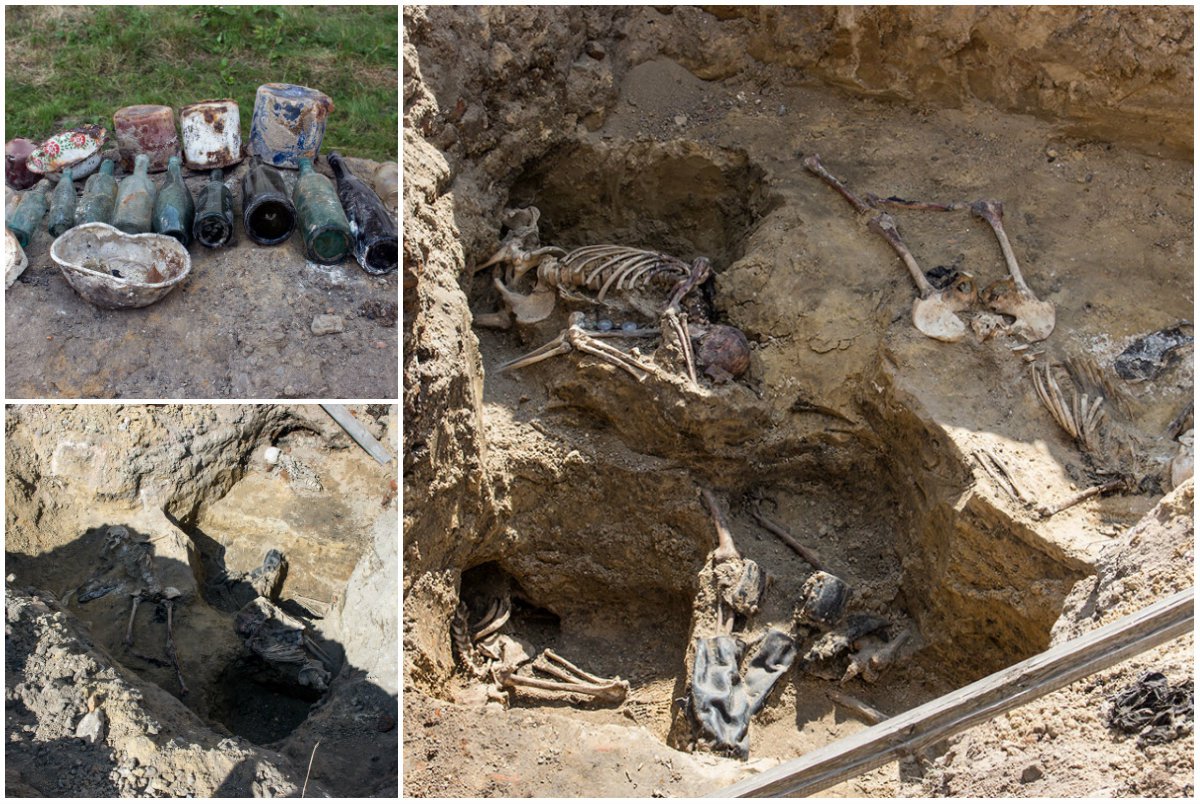Oksana Zabuzhko was born in 1960. She is a Ukrainian novelist, poet, essayist, and one of the most translated writers among contemporary Ukrainian authors. She has written a number of poetry collections, fiction novels and philosophy books, essays on Ukrainian national identity and culture, and on feminism and gender issues.
On 9 March 2019 she was awarded the Shevchenko Prize, the highest state award in Ukraine, for the book And I'm Again Entering the Tank. The work is a collection of her articles, essays, interviews, and memoirs, written and published from 2012 to 2016. This is the critical period preceding the Revolution of Dignity and leading into the war with Russia.
Below we publish several fragments from her recent interview that unfolded like a manuscript, covering major Ukrainian problems, their causes, and possible solutions.
Many Ukrainians are survivors of ancestors who had to re-register themselves
Ukrainians are all survivors. This term is typically used for those who survived the Holocaust. But there is a broader interpretation of “survivor” that applies to the second generation, to the third, and so on. There’s a certain evolution of trauma.
We must investigate this generational impact – historians, psychologists and sociologists alike – because Ukrainians are all survivors, a whole nation. Each of us can find someone among our ancestors who has “re-registered” in this country, not as who they were in reality, but with a changed name, origin, address, and even status.
My father is from Western Ukraine which means our family faced less repression for one generation. When I discovered an old KGB report recording that he is the son of a “kulak” [an affluent peasant who was stripped of his assets in Soviet times and sometimes sent to a Gulag as part of the “dekulakization” program - Ed], I had to smile, because I know from my father’s own accounts how, in 1939, my grandfather managed to conceal from the Soviets his ownership of a shop in Rivne, a small factory, and a number of additional assets. He did so by feigning to be a peasant.
Ukrainians are still expectorating overlooked repressions of 1972
I am my home, my family, and the outcome of many generations. I am a living result of underground education – classrooms of home-taught children that Ukrainian intellectuals organized in Kyiv in the 1960s. These clandestine kindergartens were intended to bring their children together, not only to learn, but to celebrate Ukrainian holidays, to teach traditional carols, to impart a degree of Ukrainian history, to stage plays of the banned Ukrainian writer [Oleksander] Oles, and much more.
At that time there were still people who could pass on cultural memory – it was still possible to "pick up the thread" of the cultural renaissance of the 1920s.
- Read also: The Tragic 1972 Vertep in Lviv (photos)
The devastation of the Ukrainian intelligentsia (“Sixtiers”) hit hard for all of Ukrainians, and for the fate of Ukraine. The period 1972-1973 can only be framed in black--we still underestimate the significance of this wave of repressions. Ukrainians do not understand that today they continue to be affected by them.
Most people of my generation are the product of the "dead Soviet cities, where only those who came from the village spoke Ukrainian." And we were told that it was always like this. All rural children who came from the village to study in the city during the 1970s-80s were told that "in Ukraine, the cities always spoke Russian."
And this is where I pull out my Kalashnikov and scream: "Oh, you whores! Because in the 1960s ALL of the cities in Central Ukraine spoke Ukrainian! And by the 1990s, they had supposedly always been Russian-speaking?!”
“Shcherbychсhyna” [cultural policy in the Ukrainian SSR, post-1972 - Ed] was not just the arrest of dissidents – it was a complex of political ideologies for the transformation of Ukrainians into "a new historical community of people – the Soviet people”: a "town-forming enterprise of union significance" appeared in each Ukrainian city...people were shuffled all over the Union...schools became Russian-speaking…

Destruction of historical architecture in 1975-1976, or the death of Kyiv
I made an attempt to measure a “memory depth" in Kyiv. Who remembers any longer what stood in the place of the House of Trade Unions? No one mentions the destruction of historical monuments at the time of Shcherbytskyi [leader of the Communist Party of Ukraine in 1972-1989 - Ed].
They were destroyed because of the competition between Kyiv and Moscow for the title of an "exemplary city." The so-called "reconstruction”’of 1975-1976 was nothing less than a visual cleansing of Ukrainians’ memories.
Before, on the very site of the House of Trade Unions, stood the house of the Nobility Assembly. I remember when this building was the House of the Teacher, and my mother walked there with me. There was a concert hall with the best acoustics in Kyiv. Lysenko [renowned Ukrainian composer - Ed] gave his first concert there after returning from Leipzig. All Ukrainian performances of the “Coryphaeus’s” [famous Ukrainian troupe] were presented there, to packed halls. This huge house, known as the "heart of Ukrainian modernism," once occupied the whole quarter. But it prevented Kyiv from being an "exemplary Soviet city." Therefore, it was simply torn down in 1975.

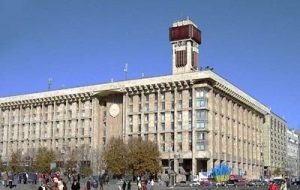
The memory was wiped out in the same manner as it is now cleansed in the “Donetsk People’s Republic” [Russian-controlled proxy statelet in eastern Ukraine - Ed]. The first thing they did there was to destroy the monument to victims of the Holodomor [Stalin’s artificial famine which took the lives of at least 4 million Ukrainians in 1932-1933 - Ed].

- Read also: The Crimean Tatar Palace and other historic sites Russia is destroying in occupied Crimea
The Kyiv I remember as a teenager was already a dead city. That Kyiv is the one described today as having had “such tasty ice cream,” because there is nothing more to say about the Kyiv of that time.
The Ukrainian elites were very frightened after all the detentions – to the extent that we all spoke Russian in the streets, switching to Ukrainian only at the threshold of the apartment.
"Drink and get laid” is the brief summary of my generation’s student years. The city was not what it had been – it became parochial. And yes, we all used to go to Moscow for "intellectual food." It is precisely from those times that some people who are living in the past still think that "there is no Ukrainian culture" and "how can we exist without Russian literature?"
https://www.youtube.com/watch?v=LkZDAl6MOkQ&feature=youtu.be
Video: One of so-called “sleeping” districts in Kyiv in 1972
Concerning food, it was always better in Ukraine than in Moscow
Ukraine was always eating better than Russia. I suspect that this is also a topic for unwritten treatises. Don’t forget that we literally live on ground that holds much of the planetary fertile chernozem reserves. We are regarded as one of the oldest agrarian civilizations, along with Egypt. When I am told that "village" life is bad, I answer "don’t be envious!"
I have a theory about this. To a large extent, Ukrainians have lost the historical competition because food was ample and they ate very well. Our land "flowed with milk and honey." We never knew the ravages of hunger. Because of this, the plan of 1933 was absolutely satanic. I see the Holodomor as a demon’s act.
In the 19th century, there were still hunger epidemics in Europe that affected entire countries. Not only Ireland but also, for example, neighbouring Poland. But we thought, what could possibly happen here [in Ukraine]. Even if there is a drought and a poor crop, reserves of large stocks are always available. The very notion of a famine from which people could die was inconceivable.
The “classroom laboratory” of the Ukrainian elites was more passionate than the rest of society in the 1990s
Having grown up in the “classroom laboratory” of the Ukrainian elites, it seemed that all educated Ukrainians should be the same. You thought that when everything collapsed, you can finally do everything – so go ahead and run! Let's do something – build a country! And then it turns out that only Solomiya Pavlychko was running as well [Solomiya Pavlychko is a writer and author of works on the theory of literature].
What is an elite? "The status obliges." You know more than others. You can do more than others. You are given more than others. Hence, your responsibility is different. This is your country, and you should think about how to do everything here.
Apparently, as I understand, this is taught in diplomatic academies. This is how state-makers are educated. You are systematically told certain things since childhood, and you have an incentive to go forward.
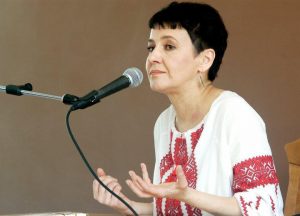
I had this incentive. And for me, it came as a shock when suddenly people who seemed to belong to the Ukrainian Soviet elite, appeared not to do anything for the country. They became consumed with personal wealth.
As it turned out, this is precisely what became the trend. And we, Solomiya Pavlychko and I, were spinning the spokes off our stationary bikes, going nowhere.
“Fieldwork in Ukrainian sex” (1996) – Zabuzhko’s first book which was a revolution for a whole generation of women
It's interesting when something is being done for the first time. Post-colonial state...rough...no television...no book market...nothing. And whatever you do is new. It is cool. I wanted of course to blow something up!
Writing this novel served to express the whole package of my claim to my culture. To the men of my culture. To the intellectuals of my culture. To my entire culture. This book was born out of my exit, so to speak, from my Soviet "cultural underground."
It was a good time, because Moscow was not concerned by us. Then, you could still do whatever you wanted. Moscow did not yet control our information sphere and journalists could report the truth.
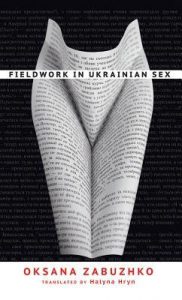
Zabuzhko’s experience in Ukrainian reforms: it became better, but everyone is dissatisfied
The history of the Shevchenko Prize is so lame, just like the history of our statehood. I mean that the prize exemplifies all of our "struggles of growth." Originally, it was the "Soviet" prize, launched at the time of the Thaw, when Ukrainians were allowed to engage in at least some of their cultural identity.
And suddenly the Revolution of Dignity happens. Someone calls me from the Presidential Administration and says: come and help [to reform the prize]. There were some four to five sessions – it was a pain and a scream.
I insisted that a democratic state can award its prize solely on the basis of one criterion – that a certain cultural figure or a certain phenomenon has a political significance... that it approaches the magnitude of state-building.
Some moaned and cried immediately, “Oh no, then it will be only the elderly, it will be a pensioner's prize. It should be a prize for avantgarde works, European.”
As soon as I hear "European," my nerves unjangle. What does it mean? Give me a definition of a "European" product, and tell me which is "non-European"? Who determines it? On what basis is such an Areopagus formed?
This will be the same principle that was held in the USSR at the time of Comrade Stalin – only the characters have changed. In short, we quarreled. Then something like the "mathematical average" was "balanced" from all the proposals by the Presidential Administration, as I understood.
Such is the model for all our reforms. They are made by this same method of “mathematical average,” so that nobody is upset and, as a result, everyone stays dissatisfied, despite the fact that it has actually become better.
Except that Sodomora wasn’t awarded in the first "post-reform" year. That offended me very much.
People like Sodomora are exactly those who give you good reason to tell your children that they belong to a nation with culture. The sign of belonging to "European culture" for any nation is not the prevalence of young hipsters, but the tradition of translations from antiquity and the presence of people who personify and symbolize this tradition.
The next time Serhiy Plokhiy was awarded, and that was good.
The Gates of Europe is an outstanding work. It is how Ukraine speaks about itself to the world today. An English-speaker who wants to know something about Ukraine, finally, has this "textbook" to explain Ukraine in terms and by views recognizable to foreigners.

Intercity train as a marker of change after the Revolution of Dignity
The language map of cities is changing. In the past few years, the rural youth stopped being afraid to speak in Kyiv “like they do at home with their parents," for the first time in my memory. I used to hear Ukrainian only from grandmothers in the marketplace, and now I hear it from young people.
It’s clear that these kids who have come from the suburbs and villages to Kyiv no longer switch to Russian. They are not embarrassed by their home language. The war has caused the grandchildren of the Holodomor, finally, to shed the shame of speaking in the way they were taught at home. But this is just one example...you have to start digging and exploring for more.
When I’m asked what has changed in the country, I have a very simple and clear indicator. By 2013, I was travelling throughout Ukraine frequently. At this time, before the war, only a dozen or so people were to be found in the first-class Intercity. The country sat at home, it didn’t travel.
Today, three trains travel the same route where only one did in the past. And tickets need to be purchased a week in advance for any class. What else do you need in order to see the change? If they are travelling, then business has revived and tourism has begun to develop. Full trains arrive and depart.
This is called cross-linking the country. The country that was deliberately divided... where everyone remained in their region... where a broadcaster was able to say on local TV that somewhere the Right Sector had burned everything to the ground.
We need a mirror that makes people see themselves in reality. Because what they are seeing now is a non-reality that is reflected on TV screens. Programs consistently report that news where someone was raped, killed, knifed... there has been a terrible road accident... and then one good item is thrown in... a panda was born in the zoo.
All of this creates an atmosphere of discontent and cynicism... and then some kind of Yulia [Tymoshenko, presidential candidate - Ed] or, God forbid, Zelenskyy [also a candidate and TV personality/comedian - Ed] crops up, and people say fuck you! Everybody! I’ll vote for Zelenskyy – at least it’ll be fun!
Current elections and self-deception that “everything is ok”
These elections are a farce. I would rather hold a referendum to prolong the term of the incumbent president. It invariably turns out like this anyway. On the one side, he [Poroshenko] stands, and on the other, a single column of all those who oppose him.
And among them are people who shouldn’t be running for the presidency – instead they should be running to escape imprisonment. If we had an honourable state, neither Tymoshenko nor Zelenskyy would even be registered as candidates.
...these elections are demoralizing. They seem like the next attempt to continue acting as if "everything is fine." Nobody wants to kill us and seize our land, as with Crimea and proxy republics.
I thought that we all paid, as a country, quite a high price in 2014 so as not to have to lie anymore – either to ourselves or to others.

Let's, God damn it, name things as they are! They came to kill. We have a young, unformed, undeveloped state, with a whole bunch of problems – political, economic, social, psychological and more. When the right hand doesn’t know what the left is doing, there is no coordination – the brain is half-paralyzed. But at least there are reflexes and the chance to rise up on one’s legs.
And we continue, in these conditions, to lie and to pretend that nothing is happening. I served on the supervisory board of a major foundation. There was a report called "Conflict in the Donbas." I cannot accept such a report, sorry. We do not have a “conflict” in the Donbas. We have the 1st and 2nd Army Corps of the Southern Military District of the Russian Federation in the Donbas. Let's call it as it is.
We currently have no other agenda except to save the state. Any other agenda is from the owners of TV channels.
What should be done?
Good question. Because the media can’t be effective anyhow at this time. We only just learned to what extent Russia is using democracy in its favour, during this hybrid war.
Political aikido – when our own power is used against us. But what can we do when all the TV channels in our country work against us?
We even have Public broadcasting, but it doesn’t work. It was supposed to serve the interests of Ukrainian society, with our own money, but there is just trouble after trouble. And when the programs have fewer views than I do on my FB page, well, sorry...
We, as a state, have a task of extraordinary difficulty. We need to win the war in the 21st century... while it is in our own territory, at the rear, a game playing out against us... while having an opponent, not at the threshold, but in our bed. These are unprecedented conditions...
And this is not only about us, but about the West as well. We need time. Time for our strength. But there is no such podium from which this can be explained to people.
To work for all those who were killed
We did not talk about education... did not talk about the process of total “intellectual degradation.” My book And I'm Again Entering the Tank is specifically about this, about global information war, about the bombing of brains, the disintegration of connections in the human mind. About the generation that switched to gadgets, has the memory of aquarium fish, and can no longer write a full sentence.
But then there is a direct link between how much this country reads and how much this country votes for populists.
With such gaping holes in our cultural history, Ukrainians are now paying for a culture actually destroyed. If a tree is cut, there are no apples. If a tree is felled, there is only a stump. We have stumps, at every step; and only sprouts grow from them. But sprouts continue to grow, and eventually stumps can grow again into trees. We are alive and it could be worse.
It can’t be as in Britain, where the writer needs only to solve their own creative challenge... I need to work for all those who were killed
So the best answer to the question "what to do?" in my opinion was given by the Bernardines. They have a motto, ora et labora, “pray and work.” I think it is very optimistic.
We are coming out of the previous century, in which we had to be killed, and entering our own new century, in which we have a role to play in the historic scene, in the great drama of peoples. This is a profound role for which we have not begun to prepare.
It is time to pivot on a head. Ukraine is at the forefront of a huge world battle that will transform humanity. We are at the solar plexus itself in which history is being made.
I would harken the words of Viacheslav Lypynskyi [Ukrainian political philosopher], who quoted a wise Galician peasant: "It seems that God wants to fashion a solid and sharp-edged axe from us, since he hardens us so harshly." We withstood in 2014-2015, but the challenges have not ended, they crop up one after another.

Edited by Vidan Clube

